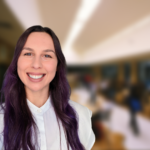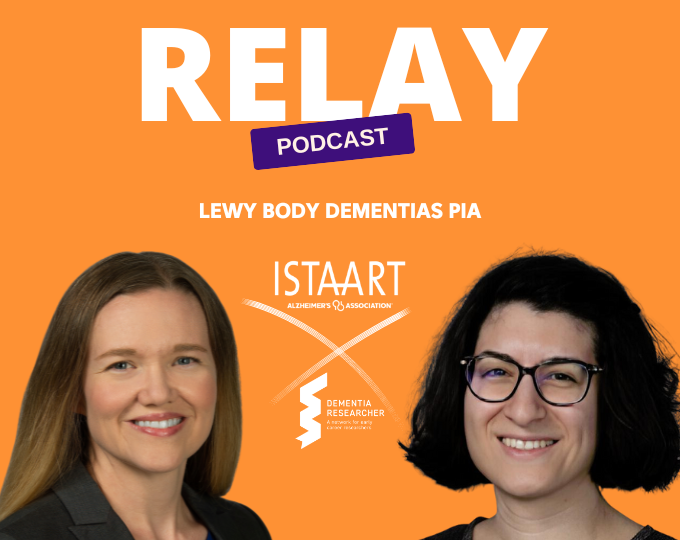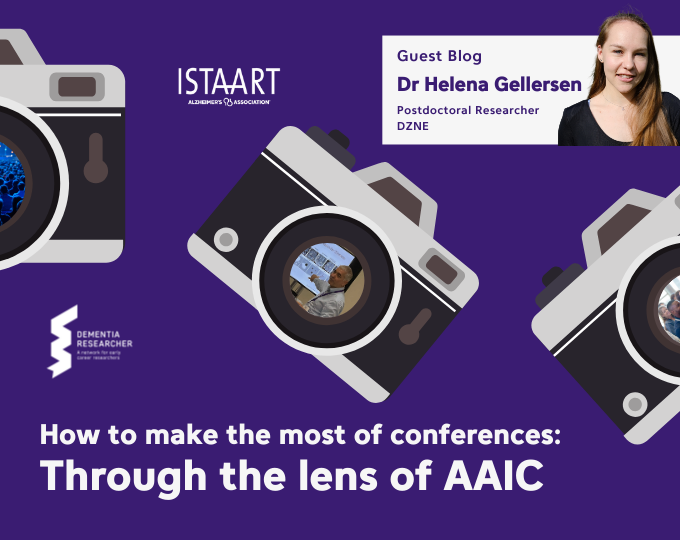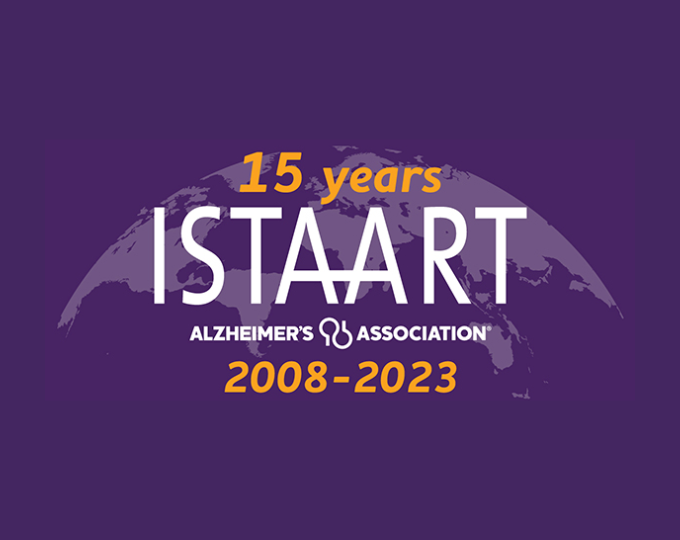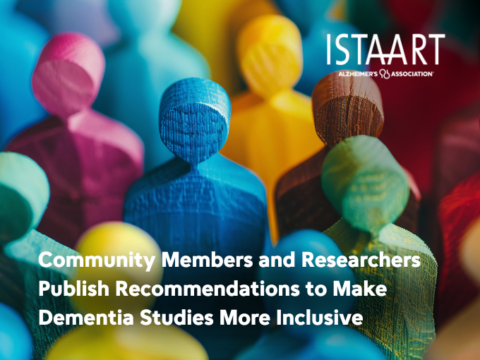Join us for another episode of the ISTAART Relay Podcast from Dementia Research. This time Dr Ece Bayram moves from interviewee to interviewer and chats with Dr Diana Karamacoska, the vice chair of the Partnering with Research Participants PIA.
This episode explores the challenges and breakthroughs in dementia research, with a special focus on engaging underserved communities, and public involvement. Dr Karamacoska shares her personal journey inspired by her grandparents' experiences with dementia, highlighting the gaps in services and the importance of culturally appropriate care.
Discover how the ISTAART PIAs are transforming dementia research through meaningful partnerships and inclusive practices. Learn about the global shift towards collaboration with research participants and the innovative approaches being used to address disparities in dementia care. Diana also discusses the significance of maintaining well-being while working closely with affected communities and the role of the PIA in supporting researchers.
Tune in to explore the latest trends, including the exciting initiatives planned for the upcoming Alzheimer's Association International Conference (AAIC) in Philadelphia, and understand why the Partnering with Research Participants PIA is unique in its dedication to patient and public involvement.
Voice Over:
Hello, and thank you for listening to the fifth season of the ISTAART PIA Relay Podcast, brought to you by Dementia Researcher.
ISTAART is a professional society and part of the Alzheimer's Association, representing scientists, physicians, and other dementia professionals active in researching and understanding the causes and treatments of Alzheimer's disease and other dementias.
In this six-part series, we have members of ISTAART Professional Interest Areas taking turns at interviewing their colleagues and being interviewed themselves, with the interviewee going on to be the next episode's interviewer. We're sure you've listened before so you know what to expect. We'll be releasing one of these podcasts each day in the buildup to the Alzheimer's Association International Conference, which this year takes place in Philadelphia.
Through the series, we hope you'll learn more about some of the amazing research happening in different fields of discovery, and about the great work taking place in the ISTAART PIAs. Thank you for listening.
Dr Ece Bayram:
Hello and thanks for tuning in. I'm Ece Bayram. I'm an assistant professor at University of Colorado Denver, Neurology Department, Movement Disorders Centre. I work on the Lewy Body Dementias PIA, and I'm the new communications chair. I'm very excited today to be talking with Diana Karamacoska.
Hi, Diana. Can I start by asking you to introduce yourself and tell us which PIA you're involved with?
Dr Diana Karamacoska:
I'm Diana Karamacoska. I'm the vice chair of the Partnering with Research Participants PIA, and we're really excited to be on here today because it's our first time. We're total newbies.
Dr Ece Bayram:
Well, this is exciting. So to start things off, could you tell us a little bit about your research? What do you work on?
Dr Diana Karamacoska:
I'm an early career researcher from Western Sydney University, focusing on dementia education and service gaps in underserved communities. And this work was actually really inspired by my grandparents' experiences with dementia. So when I had started my PhD in neuroscience, my grandmother was suspected of having mental health issues, and that later turned out to be a diagnosis of vascular dementia mixed with Alzheimer's disease.
So because I was studying the brain at the time, I delved into dementia research a little bit more, just to learn about the diagnosis and how we could support her better. It definitely wasn't easy for me or my family. We really grappled with the misperceptions that we kind of held onto regarding dementia, its causes, and what it actually meant for her as time went on. And there was a lot of stigma that we were conscious about, especially within our community.
So to make matters worse, the services that we have here in Australia weren't really available in her language, and she didn't necessarily have any culturally-appropriate services to access either. So a lot of that care and the management of her health has fallen back onto the family members, like myself and my mom. So we've been managing her care for about 10 years or so, and her story is just one of hundreds of thousands, if not millions of people who come from one of those immigrant backgrounds and are living in a different country where the main language is not necessarily spoken by the family.
So when I started my fellowship, I connected with a lot of different community groups who shared our experiences, and I realised that this is a serious problem that had gone unaddressed for decades. The gaps and the problems that had been extensively researched about, no one was really stepping up to take these on and actually overcome them. So I kind of made it my mission to be solution-orientated for these immigrant and refugee communities.
Dr Ece Bayram:
So I have a question on that, because I work a lot with communities myself too. How do you maintain your wellbeing in the process, because I feel like it can really take a toll, especially since you have a personal story attached to it too. How do you just keep your head focused and be sane in all this? Because it's tough, especially once you get into the disparities. It's really disheartening to see all this. So what do you do for that?
Dr Diana Karamacoska:
That's such a great question. And to be honest, I'm still working that out. I've been doing this for a couple of years now, and I'm recognising what kind of patterns I'm getting into, and maybe I'm getting a little bit overloaded with some of the stories that I'm hearing or some of the outreach activities that we're doing. It can just get blocked up, in terms of my week.
So I'm starting to manage my time a little bit better and really spacing my engagements out. And I practise a lot of mindfulness and exercise so that I can disengage with some of my work, and then maintain my wellbeing at home. But I have to say that, when I am on the ground and I'm hearing about what people go through, or have been through, it kind of motivates me even more so to do the work that we're doing.
And I always reflect on how much courage they have and how much they're actually bringing to the table when they open up and share these stories with us, and how you become sort of like a keeper of that. And you want to nourish it, you want to actually use it for good and hope that you are able to make an impact, or just move the needle a little bit further so that we can improve the situation, if not now, maybe a few years down the track.
Dr Ece Bayram:
Do you feel like the PIA is a good way of support in that sense, being in a community of other like-minded researchers? Do you find that helpful?
Dr Diana Karamacoska:
Absolutely. So our PIA has been really influential in the way that I go about my work. I've been exposed to some very experienced and very diverse experts, as well as care partners who've been involved in a lot of the projects that we've been seeing, clinical trials. It could be community-based research, health services research even. And so, it's really taught me how to flip the script around how we approach our research projects.
So instead of asking how can our research participants help me achieve my research aims and goals, we really should be asking, "Well, how can I actually help these research participants and their families achieve the outcomes that they want and need?" And I think having that mindset from the get-go enables you to have, I guess, a more collaborative, more meaningful approach to your work. And my peers have been the ones to really show me that.
Dr Ece Bayram:
Do you find differences in different regions, different countries? Because you're from Australia, and I'm assuming the PIA probably has a more global representation too. Do you find the issues brought up in different regions to be different, or do you feel like it's pretty much the same overall?
Dr Diana Karamacoska:
Well, our PIA's executive committee is made up of people from the US, or North America, Europe and Australia. So we do have kind of overlapping barriers, that I'm going to say, to how we conduct this kind of work. And we're noticing as well that, even in under-resourced countries, maybe some that haven't been represented in our PIA committee yet, are also facing some of the challenges that we initially encountered when we embarked on our advocacy efforts.
So things like actually including care partners and people living with dementia in more advisory roles or capacities, whether it's in your research projects or within policy development. Actually getting them a seat at the table can be really challenging because of the systems that we have, or maybe the societal structures, the hierarchies that are at play. So now that some of us have been able to navigate this within our own communities, or in our own projects, we have been able to mentor others who are wanting to do the same.
Dr Ece Bayram:
What are the hot topics right now in the field? What are some exciting areas?
Dr Diana Karamacoska:
So I think I'm most excited about the overall global shift towards partnership projects in the dementia research field. I'm seeing a lot of prescriptive guides, workshops and how-to manuals that teach people about partnering with research participants. It could be patients, people who are living with dementia, could be members of the public or even care partners. And so we've started to appreciate how this is actually bleeding into the work and advocacy efforts in under-resourced parts of the world.
And I was mentioning that before, where we've started a lot of informal mentoring. There's a lot of collaboration that's now happening between different countries, industries and societies. So I feel like that, for me, has been really exciting and I hope to see it flourish a little bit more.
Dr Ece Bayram:
So how does your PIA come into play for these initiatives?
Dr Diana Karamacoska:
I think we do a lot to help with capacity building and promoting inclusive research practises. So we really teach people the principles of equity and inclusion. I've been really lucky to hear from so many experienced researchers and research partners about what works and what doesn't work in different contexts. So thinking about what's going on in one particular community, how we might learn from that and apply it to a different community, or a different part of the world.
And a lot of this has actually come through the discussions and the training that we have, like our basics webinars and conference workshops and seminars. So I do feel like, with many funding bodies and advocacy groups around the world, now require researchers to engage patients, or the public as collaborators on projects. And our PIA really helps people to actually do this, to facilitate the relationship-building and those connections that are needed to get you started.
Dr Ece Bayram:
So do you have any patients, caregivers, care partners in your PIA right now? How is it structured?
Dr Diana Karamacoska:
Excellent question, because we do have a dedicated patient and public involvement chair. So this is currently being held by is Helen Medsger, and she has over 35 years of experience as a family caregiver, 17 years as a research participant and 10 years of involvement in PPI, or patient public involvement, in governmental dementia policies.
So she really has brought a wealth of knowledge and connections to our PIA, and she really advocates for the voices that we're not hearing enough of, for example, from places like Africa and Asia.
Dr Ece Bayram:
That makes your PIA very unique.
Dr Diana Karamacoska:
It does, yeah. I think we're the only PIA to have this kind of role and this kind of engagement with our research participants, care partners or the community, whatever way you want to call it.
Dr Ece Bayram:
So for the upcoming year, you mentioned some webinars; any other plans? What do we need to look out for from your PIA?
Dr Diana Karamacoska:
We've got plenty on the way, and it's really because we've engaged with our membership to figure out what people actually need to see from this PIA. And so, we're trying to do as much as we can to meet those needs.
So let's start with AAIC. I've noticed in recent years, sort of coinciding with the establishment of our PIA, that AAIC has really ramped up their efforts to address patient and public involvement in dementia research. And Sarah and Helen, so two of our executive committee members, really brought this to the forefront last year through their featured research session. They had six teams from all over the world showcasing their partnership projects and models that they've been working on, and this generated heaps more interest in what PPI is all about with partnering with research participants. And so, we've really maximised our activities for AAIC this year.
We're going to be kicking off with a half-day pre-conference workshop on the foundations of partnering with research participants. We've got a panel of people with living and caring experiences of dementia, discussing different approaches to partnership projects, and we'll be doing a lot of group activities to encourage people to think more holistically and inclusively about those partnering efforts. So this workshop, I feel like it's an unmissable opportunity for researchers to learn essential skills that are going to facilitate really strong and enduring relationships with the public, and it'll help to avoid tokenism in the process. That's just our first activity.
So next, we have PIA Day, which is right after this pre-conference workshop. It's like a pre-conference gathering of ISTAART members to preview or interact with the PIA. So not to be biassed or anything, but I think ours is going to be extra special this year. It's no debating with karaoke, like I've seen one of the other PIAs do, but I promise it's got big career development energy.
So this year will feature a very hands-on interactive session where we encourage attendees to think pragmatically about how to equitably include people with dementia who have diverse abilities and backgrounds. So we're really thinking about bringing out the quieter voices, so that everyone can get a say in how a project is conducted. We're going to simulate and address the communication challenges that some of our research volunteers may encounter when accessing research, and we really hope this sort of exercise helps build empathy and understanding of researchers to really appreciate what's needed for people to be involved as collaborators.
So the next one is a lunchtime interactive workshop, addressing how research participants can be involved in the lifecycle of a grant, so from idea generation to implementation of results or findings. So true to our PIA's name, this workshop is a partnership between our committee member, [inaudible 00:15:53], and a care partner who is currently serving on a public patient advisory group. Oh, and did I mention, people get a delicious hot meal that's free at this workshop? So it's definitely worth signing up to satiate your appetite for inclusive research.
Dr Ece Bayram:
That's exciting. I'm going to be looking out for these for sure. And since you mentioned you are in early career, do you feel like you've benefited from being a part of this PIA? Are there opportunities for advancement in the PIA as an early career, because you're in the vice chair position and I'm wondering, for people who might just be starting their careers or interested in getting involved with this PIA, are there opportunities for them?
Dr Diana Karamacoska:
Absolutely. We also, within this PIA, have a student representative role. So we do encourage students to become active members and think about what they can do for the students' membership, as well as thinking about how they might step into a more senior committee member role. So like programmes chair, communications chair, or even within the steering committee.
So all of this was structured with our amazing chair, Sarah Walter. She's actually super collaborative. She thinks really deeply about how this PIA operates, who should be included and why they should be included, and is always thinking about opportunities, not only to advance the PIA's goals and our objectives, but also thinking about the development opportunities within the PIA.
So yeah, for me, I think this has been one of the most impactful decisions I've made in my early career research, early career maybe, I don't know what to call it, the period. And I feel like it has really brought attention to what's going on around the world. It's given me heaps of connections to collaborators from around the world that I hadn't even considered.
And one of our goals right now is actually putting together a manuscript, or a publication that involves different parts of our PIA membership, and of course our people with living and caring experiences of dementia. So there's heaps of career progression opportunities within this PIA.
Dr Ece Bayram:
I'm going to ask this because it's something that comes up whenever I talk to people from my hometown, I'm Turkish, or other countries around. There is this longstanding bias that these sort of specific groups are more welcoming to, maybe, higher-income countries or people that are a bit more connected. And if you don't have connections, you're not going to make it in these groups. Do you feel like there's that bias happening in your PIA, or are you actually actively making sure that bias is not happening for your PIA?
Dr Diana Karamacoska:
Great question. Okay. Because we're fairly new, we did get set up, or organised with representatives from those high-income countries. So, now that we're sort of settled, we've kind of figured out some of our operational requirements, we are taking steps to increase the representation of people from other parts of the world, like Asia for example. So it is definitely at the forefront of our mind.
One step that we're actually taking to address this is diversifying our patient and public involvement representatives. So in addition to the chair, we want to get some representatives from different communities, just so that they can contribute to the PIA's overall activities and goals. We didn't want this to be restricted to high-income countries by any means, it just sort of started that way. But we do want to, in the future, be more representative and diverse.
Dr Ece Bayram:
I'm sure there's a lot of lessons to learn from less resourced communities that have been hustling and getting research done in those communities despite lack of resources. So they're going to bring a lot to the table where, maybe, a more resourceful community may not be aware of, and those may be very helpful for them as well.
Dr Diana Karamacoska:
Absolutely. And I feel like there's a lot of resource sharing that happens between those who are more experienced versus those who are just embarking on this journey. So that, I think, puts people ahead just that little bit further so that they're not necessarily stuck in a particular phase or zone when they're trying to advocate for more inclusion.
Dr Ece Bayram:
And I feel like it's always a good opportunity for someone that may not have as big of a network where they are, to actually get connected with bigger networks through these PIA initiatives, especially if they're interested in this specific topic, it's very fruitful for them. And I feel like we touched a little bit, but just to sum it up, why should the listeners sign up for your PIA?
Dr Diana Karamacoska:
I think passion within our PIA is unmatched. You get to see and experience amazing mentorship, collaboration, learning opportunities, and it's just endless at this stage. Plus, I'm going to be the chair for the next couple of years, so I feel like it's going to have some amazing leadership.
Dr Ece Bayram:
Well, thank you. I think it's time to end today's podcast. Thank you so much to Diana for taking time to chat with us today.
Thank you for listening. You can find profiles on myself and my awesome guest, and information on how to become involved in ISTAART on our website at dementiaresearcher.nihr.ac.uk, and also at alz.org/istaart. There's a link in the show notes, so don't feel burdened to follow what I'm saying with messing up the links, probably.
I'm Ece Bayram and you've been listening to the Relay Podcast from Dementia Researcher and The Alzheimer's Association. Hit subscribe on YouTube or in your favourite podcast app to ensure you don't miss an episode from us. Thank you so much.
Dr Diana Karamacoska:
Thank you so much for having me.
Dr Ece Bayram:
Goodbye.
Voice Over:
The Dementia Researcher Podcast was brought to you by University College London, with generous funding from the UK National Institute for Health Research, Alzheimer's Research UK, Alzheimer's Society, Alzheimer's Association, and Race Against Dementia. Please subscribe, leave us a review and register on our website for full access to all our great resources, dementiaresearcher.nihr.ac.uk.
END
Enjoyed the podcast? Please review, like, and share - and don't forget to subscribe to ensure you never miss an episode.
If you would like to share your own experiences or discuss your research in a blog or on a podcast, drop us a line to dementiaresearcher@ucl.ac.uk
Did you know... you can find our podcast in your favourite podcast app on mobile devices, and our narrated blogs are also available as a podcast.
This podcast is brought to you in association with the Alzheimer's Association, Alzheimer's Research UK, Race Against Dementia and Alzheimer's Society, who we thank for their ongoing support.
The views and opinions expressed by the host and guests in this podcast represent those of the guests and do not necessarily reflect those of UCL or Dementia Researcher

 Print This Post
Print This Post
